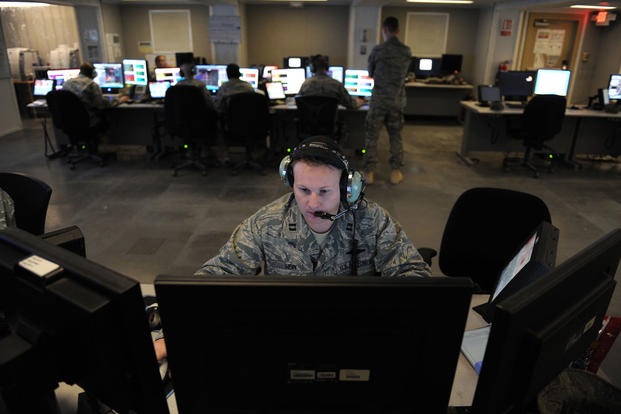Robins Air Force Base has been selected to host an elite system that will fuse intelligence, surveillance and reconnaissance sensor data from around the world, the Air Force announced Wednesday.
The Georgia base, which currently hosts the E-8C Joint Surveillance Target Attack Radar System aircraft, or JSTARS, will be home to the next-generation Advanced Battle Management System, the service said in a release.
"We must adapt our capability to survive in the changed threat environment and move swiftly to advanced battlefield management and surveillance," said Air Force Secretary Heather Wilson. "The critical capabilities at Robins allow us to leverage key expertise and accelerate toward the network needed for contested environments."
The ABMS is intended to replace the current JSTARS fleet, which will keep flying until the mid-to-late 2020s. The network, which fuses the data from hundreds of sensors to provide situational awareness for combatant commanders across the globe, will function "as [a] decentralized system that draws on all domains," said Air Force Chief of Staff Gen. David Goldfein.
Related content:
- Lawmakers Push to Keep Air Force JSTARS Recap Program
- Air Force Kills JSTARS Upgrade
- Lawmakers: Air Force May Scrap E-8 JSTARS Upgrade
"This is an important step as we move forward with a resilient and survivable network to ensure we are ready to prevail against changing threats," Goldfein said in the release.
The network will leverage air and space systems and will include "a fusion center and associated supporting activities," the service said. "In addition, the network will also include some remotely piloted aircraft at Robins with sensors capable of collecting and transmitting information from the battlefield."
Officials have said RPAs such as MQ-9 Reaper aircraft would be used to plug into such a network for additional situational awareness.
Sens. Johnny Isakson and David Perdue, both Republicans from Georgia, were optimistic but cautious about the announcement Wednesday. They have previously voiced concerns over the Air Force's plan to cancel the JSTARS recapitalization program in favor of the ABMS.
"We welcome any and all new missions that the Air Force is willing to bring to Robins, and I will continue to work with the Air Force as the implementation of this plan proceeds," Isakson said in a joint statement with Perdue. "In the meantime, I urge Secretary Wilson to work with us to ensure that there will be no capabilities gap that could put our warfighters at risk during the transition to this new system."
Perdue added, "This additional new mission at Robins will be critical to fulfilling President Trump's National Defense Strategy and provides for the new Advanced Battle Management System."
Both senators in August said they were "alarmed" to find out earlier that month that the Air Force might pursue "alternative intelligence, surveillance and reconnaissance platforms" instead of procuring a JSTARS replacement.
The service in 2016 launched a $6.9 billion request for proposal for the engineering, manufacturing and development phase of the upgraded aircraft. It had planned to buy 17 new aircraft.
In February, during the Air Force's fiscal 2019 budget rollout briefing, service officials said they were scrapping the initiative. The current JSTARS fleet is capable of developing, detecting, locating and tracking moving targets on the ground.
The Air Force on Wednesday said there is no intent to reduce manpower at Robins as it transitions to ABMS.
Lawmakers want to ensure there is no capability gap for troops on the ground as the service moves from the E-8C to the ABMS system.
In April, the House Armed Services tactical air and land forces subcommittee in its markup to the fiscal 2019 National Defense Authorization Act said it will cap funding for the ABMS program until the Air Force restores the JSTARS recapitalization contract.
The HASC passed its version of the fiscal 2019 bill on May 10.
But members of the Senate Armed Services Committee have hinted they are open to the Air Force's effort to invest in a more survivable system than the JSTARS, which could be shot down.
"There's a recognition in the Senate bill that we don't want to retire aircraft too quickly before a replacement capability arises such that we end up with a gap," an SASC staffer told Defense News on May 30. But "we do not direct them to proceed with the recap out of concerns with survivability, which we share with the department."
The Senate is poised to vote on the bill in coming weeks.
-- Oriana Pawlyk can be reached at oriana.pawlyk@military.com. Follow her on Twitter at @Oriana0214.









